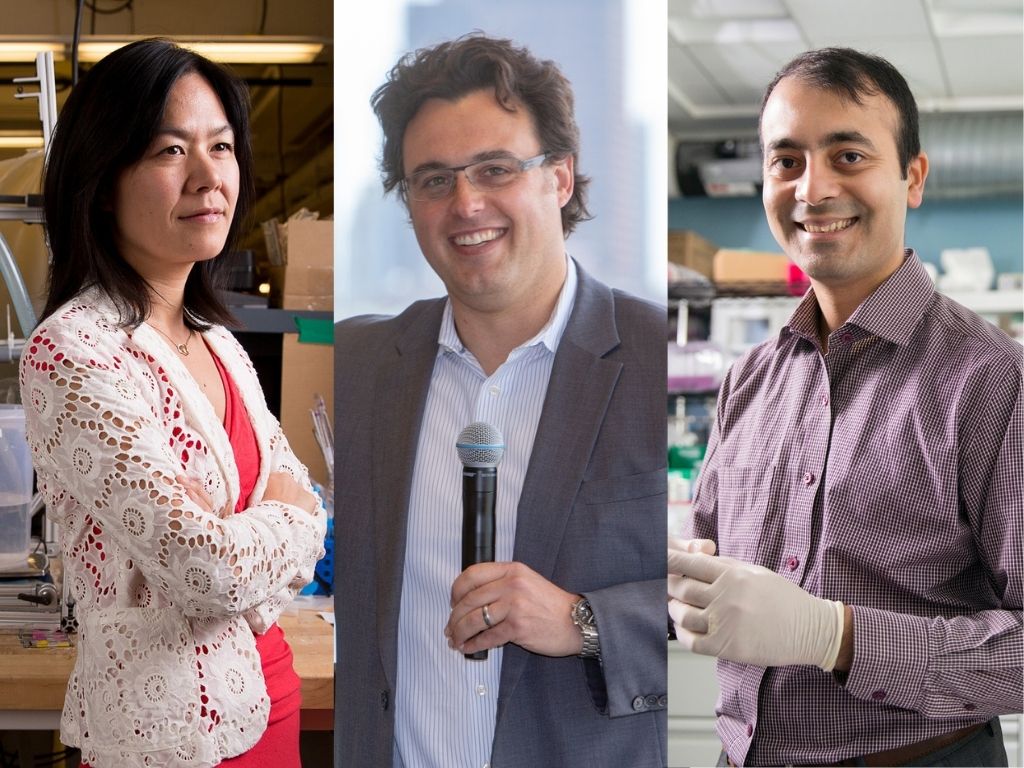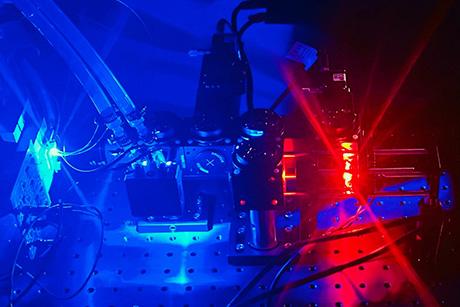MIT J-WAFS awards eight grants in seventh round of seed funding
The Abdul Latif Jameel Water and Food Systems Lab (J-WAFS) at MIT has announced its seventh round of seed grant funding to the MIT community. J-WAFS is MIT’s Institute-wide initiative to promote, coordinate, and lead research related to water and food that will have a measurable and international impact as humankind adapts to a rapidly expanding population on a changing planet. The seed grant program is J-WAFS’ flagship funding initiative, aimed at catalyzing innovative research across the Institute that solves the challenges facing the world’s water and food systems.
This year, eight new projects will be funded, led by nine faculty principal investigators (PIs) across six MIT departments. The winning projects address challenges that range from climate-resilient crops, food safety technologies and innovations that can remove contaminants from water, research supporting smallholder farmers’ productivity and resilience, and more.
Many of the projects that were selected for funding this year are focused on agriculture and food systems challenges, and these innovations could not be more timely. “Agriculture and food production are responsible for more than 30 percent of the world’s greenhouse gas emissions. Even if we could completely shut down fossil fuel emissions today, agricultural emissions would prevent us from meeting the targets of the Paris accords. Simply fixing energy systems will not be enough,” says J-WAFS Director John H. Lienhard V. “It will take researchers working in all sectors and disciplines working together to address these challenges to meet the needs of current and future populations despite the challenges posted by climate change. The innovations that are being developed at MIT, such as those that we selected for funding this year, are truly inspiring and can lead the way toward a food-secure future.”
Water and food systems challenges are inspiring a growing number of faculty across the Institute to pursue solutions-oriented research. Over 190 MIT faculty members from across all five schools at MIT as well as the MIT Stephen A. Schwarzman College of Computing have submitted proposals to J-WAFS’ grant programs since its launch in 2015. In 2021 alone, 37 principal investigators from 17 departments across all five schools proposed to the J-WAFS seed grant program. Competing for funding were established experts in water and food-related research areas as well as professors who are only recently applying their disciplinary expertise to the world’s water and food challenges. Engineering faculty from four departments were funded, including the Departments of Civil and Environmental Engineering, Chemical Engineering, Materials Science and Engineering, and Mechanical Engineering. Additional funded principal investigators are from the Department of Biology in the School of Science, the Sloan School of Management, and the MIT Media Lab in the School of Architecture and Planning.
The eight projects selected for J-WAFS seed grant funding and detailed below will receive $150,000, overhead-free, for two years.
Ensuring climate resilience in agriculture and crop production
Climate change poses a grave risk to water availability and rain-fed agriculture, especially in sub-Saharan Africa. "Impact of Near-term Climate Change on Water Availability and Food Productivity in Africa," a project led by Elfatih A. B. Eltahir, the Breene M. Kerr Professor in the Department of Civil and Environmental Engineering, aims to better understand the projected near-term effects of the climate crisis on agricultural production at the southern edge of the Sahara Desert. Eltahir’s research will focus on integrating regional climate modeling with an analysis of archived observations on rainfall, temperature, and yield. His goal is to better understand how impacts of climate change on crop yields vary at the regional level. His team will work closely with other scientists and the policymakers in Africa who are in charge of planning climate change adaptation in the water and agriculture sectors to support a transition to resilient agriculture planning.
The climate crisis is projected to affect agricultural productivity worldwide. In nature, species adapt to environmental changes through the natural genetic variation that exists within a specific population. However, the time frame for this process is long and cannot meet the urgent need for food crops that are adaptable in a changing climate. With her project, "A New Approach to Enhance Genetic Diversity to Improve Crop Breeding," Mary Gehring, an associate professor in the Department of Biology, is re-imagining the future of plant breeding beyond current practices that rely on natural variation. Supported by a J-WAFS seed grant, she will develop methods that rapidly produce genetic variations in order to increase the genetic diversity of food crop species. Using pigeon pea, a legume that is widely grown as a food, they will then test these variations against environmental stresses such as heat and drought in order to identify strains that could be more adapted to climate change.
Food loss and waste, which accounted for 32 percent of all food produced in the world in 2009, presents grand societal, economic, and environmental challenges, especially when climate change threatens current and future food supplies. In developing countries where food security is still a great concern, food loss is largely due to lack of adequate refrigeration for post-harvest food. Technologies exist for crop storage that use evaporative cooling, but they are less effective in hot and humid climates. Jeffrey C. Grossman, the Morton and Claire Goulder and Family Professor in Environmental Systems in the Department of Materials Science and Engineering, has teamed up with Evelyn N. Wang, the Gail E. Kendall Professor in the Department of Mechanical Engineering, to find a solution. With their project, "Hybrid Evaporative and Radiative Cooling as a Passive Low-cost High-performance Solution for Food Shelf-life Extension," they are developing a low-cost device using an innovative combination of two methods of cooling: evaporative and radiative technologies. Their structure will use solar-reflecting materials and highly porous insulation to double the shelf life of perishable foods in remote and rural settings, without the need for electricity.
Addressing pathogens and pesticide contamination with novel technology
Food-borne illness represents a major source of both human morbidity and economic loss; however, current pathogen detection methods used across the United States are time- and labor-intensive. This means that food contamination is often not detected until it is already in the hands of consumers, requiring costly recalls. While rapid tests have emerged to address this challenge, they are do not have the sensitivity to detect a wide variety of contaminants. Rohit Karnik, a professor in the Department of Mechanical Engineering, has teamed up with Pratik Shah, a principal research scientist at the MIT Media Lab, to develop a food safety test that is rapid, sensitive, and easy to use. The device that they are developing with their project, "On-site Analysis of Foodborne Pathogens Using Density-Shift Immunomagnetic Separation and Culture," will use a novel technology called density-shift immunomagnetic separation (DIMS) to detect a wide variety of pathogens on-site within a matter of hours to enable on-site testing at food processing plants.
Pesticide ingestion by humans poses another health challenge. A class of chemicals called organophosphates (OPs) — commonly used for pesticides — is particularly toxic. Though some OPs have been discontinued, many of these toxic chemicals remain widely available and continue to be used for weed control in agriculture and to reduce mosquito populations. Currently, OP can only be detected in blood or urine after a person has been exposed, and the methods for detection are costly. With her project, "Engineered Microbial Co-Cultures to Detect and Degrade Organophosphates," Ariel L. Furst, an assistant professor in the Department of Chemical Engineering, is developing a technology to more quickly and effectively detect and remove this chemical. She is engineering specific strains of bacteria to work together to both detect and degrade OPs. These bacteria will be deployed using a single electronic device, which will provide a modular, adaptable strategy to detect and degrade these harmful toxins before they are ingested.
Aquaculture is widely recognized as an efficient system that can enable the production of healthy protein for human consumption with a minimal impact on the environment. With 85 percent of the world’s marine stocks fully exploited, it plays a pivotal role in current and future food production. However, the industry is challenged by the spread of preventable infectious diseases that cripple farmed fish populations and can cause substantial economic losses. Fish vaccines are in use for certain diseases, but effective delivery is challenging and costly, and can lead to adverse effects to the fish. Benedetto Marelli, the Paul M. Cook Career Development Associate Professor in the Department of Civil and Environmental Engineering, is developing a solution. With his project, "Precise Fish Vaccine Injection Using Silk-based Biomaterials for Sustainable Aquaculture," he is creating a microneedle for fish vaccination that is made of silk. This novel technology will enable controlled drug release in fish and will also naturally degrade in water, which will support the health of fish populations and reduce losses for aquaculture farms.
Improving the resilience of rural populations and smallholder farmers
Regions around the world that don’t have access to safe or abundant supplies of freshwater often rely on small-scale, decentralized groundwater desalination devices that use reverse osmosis. Unfortunately, these systems are extremely energy-intensive, and therefore are both expensive to operate and environmentally unsustainable. Amos G. Winter V, an associate professor in the Department of Mechanical Engineering, is working on a new design for desalination devices for settings such as these that has the potential to make reverse osmosis water treatment more affordable and better able to be powered by renewable energy. With his project, "A Sliding Vane Energy Recovery Device (ERD) for Photovoltaic-Powered Brackish Water Reverse Osmosis Desalination (PV-BWRO)," Winter and his research team will focus on affordability, energy efficiency, and ease of use in their design to ensure that the resulting technology is accessible to poor and rural communities around the world.
Agricultural supply chains in developing countries are highly fragmented and opaque. Millions of smallholder farmers worldwide are the main producers, and often sell through a complex network of traders and intermediaries. Due to the highly fragmented nature of this system, these farmers persistently struggle with low productivity and high poverty. In an effort to find a solution, many countries have invested in mobile technologies that are intended to improve farmers’ market and information access. However, there remains a disconnect between the data that are collected and distributed via these mobile platforms and their effective use by smallholders. Yanchong Zheng, associate professor of operations management at the Sloan School of Management, aims to fill this gap with her project, "Improving Smallholder Farmers’ Welfare with AI-driven Technologies," by developing AI-driven market tools that can sift through the data to develop unbiased weather, crop planning, and pricing information. Additionally, she and her research team will develop recommendations based on these data that can more effectively inform farmers’ investments. The team will work in close collaboration with public and private sector organizations on the ground in order to ensure that their solutions are informed by the specific needs of the smallholder farmers that they seek to support.
With the addition of these eight newly funded projects, J-WAFS will have supported 53 seed grant research projects since the program launched in 2014. The J-WAFS seed funding catalyzes new solutions-oriented research at MIT and supports MIT researchers who bring a wide variety of disciplinary tools and knowledge from working in other sectors to apply their expertise to water and food systems challenges. The results of this investment are already evident: to date, J-WAFS’ seed grant PIs have brought in nearly $15 million in follow-on funding, have published numerous papers in internationally recognized journals and publications, obtained patents, and launched spinout companies. Each project yields fresh insights and engages J-WAFS with new partners and thought leaders who drive the development of solutions at and beyond MIT.



